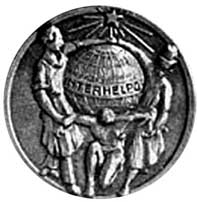Interhelpo
The Interhelpo was an industrial association of workers and peasants ( Esperanto and Idisten ) from Czechoslovakia that existed and from 1923 to 1943 was established for the purpose of economic construction in the Soviet Kyrgyzstan to support.
history
The cooperative was founded in 1923 in Žilina , Czechoslovakia (now Slovakia ). Between 1925 and 1932, 1078 people (407 members of the cooperative and 671 family members, including mainly Czechs and Slovaks, but also Hungarians, Ruthenians and other nationalities) were transported to Kyrgyzstan from the stations in Žilina and Brno on four trains. The Soviet government of Kyrgyzstan assigned the volunteers steppe land in the west of Pischpek (later Frunze, today Bishkek), where they lived in simple earth huts under the most adverse conditions at first. Despite the great initial difficulties, the cooperative built up a number of successful companies in a short time:
- 1925 the first power station in Kyrgyzstan
- 1927 a textile factory
- 1928 a smelter
as well as a furniture factory and various buildings in the city area.
In 1925, Interhelpo was declared the best cooperative in the Soviet Union. In 1934, 20 percent of Kyrgyzstan's industrial products were manufactured by this cooperative.
Interhelpo was liquidated in 1943. The cooperative members were persecuted and some of them were executed as enemies of the Soviet Union.
The members of the family also included Alexander Dubček's parents , who thus spent part of his childhood in Bishkek.
literature
Petr Kokaisl, Amirbek Usmanov: Dějiny Kyrgyzstánu očima pamětníků . Nostalgie, Prague 2012, ISBN 978-80-905365-0-0 , p. 148 ff . (Czech, full text in Google Book Search [accessed April 3, 2019]).
Web links
- Interhelpo - Czechoslovak traces in Bishkek ( Memento from March 31, 2019 in the Internet Archive )
- Czechoslovakian traces in Bishkek ( Memento from April 19, 2017 in the Internet Archive )
